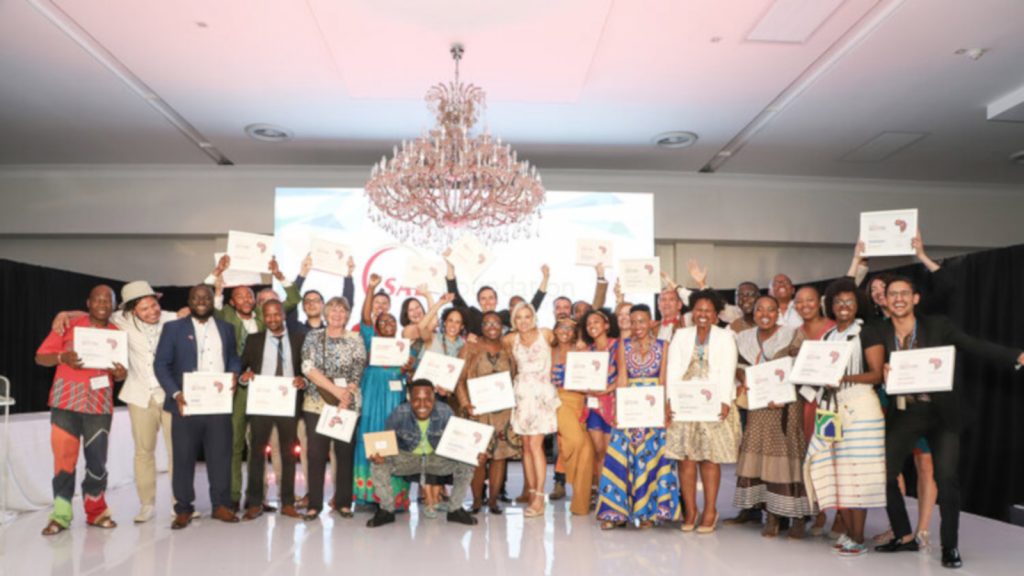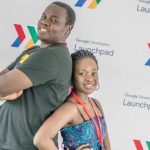Four young scientists, accompanied by Eskom Expo’s Business Manager, Mmamoloko Rancia Riba, won their place to represent the country at the Indonesia competition, renowned…
Meet the winners of SAB Foundation’s 2019 social innovation, disability empowerment awards

Cape Town recycling service Regenize has been named the winner of this year’s SAB Foundation Social Innovation Awards.
This, while OptiShunt — an implantable device that prevents glaucoma in patients — and a second company, Specialised Seating for Disabled Children, were jointly awarded first place in the Disability Empowerment Awards.
The SAB Foundation said in a statement last week that it awarded a total of R13.7-million to 20 finalists at the awards which were held last Thursday (16 October) in Johannesburg.
The 20 finalists of this year’s SAB Foundation Social Innovation and Disability Empowerment Awards won a total of R1.3-million in funding
Regenize, OptiShunt and Specialised Seating for Disabled Children were each awarded R1.3-million in funding.
Here’s a complete breakdown of all 20 finalists:
Social Innovation Award winners
Regenize: Chad Robertson and Nkazimlo Miti have developed a free and inclusive service that offers individuals rewards in form of virtual currency based on the weight of their recyclable materials
PlastiBrick: Developed by Kekeletso Tsiloane, PlastiBrick is made from recycled plastic. The bricks the company makes are durable, fire retardant and environmentally friendly. PlastiBrick was placed second and won R900 000.
Put It Out Mini Fire Extinguisher: Toli Altounis developed this cost-effective, non-toxic and easy-to-use fire extinguisher. Put It Out was placed third and won R750 000.
Vollar: Kyle Ueckermann has established a digital currency incentive to uplift low income and informal settlements. Vollar provides disadvantaged individuals with a means to access essential products and services by earning Vollar incentives for bettering themselves or their communities. Vollar won the Development Award and R600 000 (also, see this story).
Spoon Money: Nicolette Swartz established Spoon Money with the idea of a multi-sided platform, which facilitates capital deployment to underserved communities who struggle to access the formal sector. Spoon Money also won the Development Award and R 600 000 (also see this and this story).
Street Booksellers: As part of the Denis Hurley Centre, Stuart Talbot established a programme that specialises in empowering unemployed and homeless men and women to sell second-hand books around Durban. Street Booksellers won the Development Award and R400 000.
Tanks Coding App: Professor Jean Greyling and his student, Byron Batteson, are developing a free mobile application that makes use of puzzles and image recognition to introduce learners to coding without the use of a computer. Batteson first produced it for his BSc Computer Science Honours project at Nelson Mandela University. Tanks Codding App also won the Development Award and R400 000.
Spinetector Safety Costume: Sello Malinga developed a safety suit that is used to minimise the impact of injuries sustained by mineworkers when their upper bodies are hit by heavy machinery or rocks. The innovation won a Development Award and R400 000.
NuNanny: Melisa Clayton Allardice established an online website that allows parents to connect, book, and pay for experienced nannies for babysitting and all kinds of childcare. NuNanny won a R200 000 seed grant.
FundaBot: Ntombikayise Banda developed a low-cost robotic platform designed to teach learners programming and engineering skills in mechanics and electronics in in their home language. FundaBot won a R200 000 seed grant.
Mobile Rural Technology Park: Luleka Mkuzo designed a mobile technology park equipped with multiple laptops to give learners and teachers of rural communities’ access to technology, the internet, and basic computer skills. His technology park won a R200 000 seed grant.
Kuba: Jacques Sibomana developed software that allows small business owners to build a digital administrative track record and supplies them with supportive services that simplify their trade with large corporate companies in and around Cape Town. Kuba won a R200 000 seed grant.
Moonshine Reflective Paint: Memphis Kaotsane from Taung, North West, designed reflective paint that helps reduce night-time collisions between vehicles and stray animals, livestock and cyclists. Moonshine Reflective Paint won a R200 000 seed grant.
Pro Se Legal: Grace Gichanga developed a chatbot that provides practical and relevant legal information via chat platforms, such as WhatsApp and Facebook Messenger. Information is available 24 hours a day and is provided though text, video, audio, and images. Pro Se Legal won a R200 000 seed grant.
Recycled Glass Turned Countertops: Jabulani Dlamini established Recycled Glass Turned Countertops, a business that specialises in collecting, weighing, and paying waste pickers for their recycled glass which it re-fashions into countertops, floor and wall tiles, and sculptures. The business was awarded a R200 000 grant.
Boolyx Edu-Tech: Kutlwano Ngwarati established an online platform for university students to access more affordable textbooks and academic publications. This platform allows students unlimited access to over 400 000 textbooks for a monthly subscription. The startup was awarded a R200 000 grant.
NuMaths Kids App: Lungile Maile developed a mathematics mobile application with 120 games that are designed to entertain and educate children between the ages of four and seven. NuMath Kids App was awarded a R200 000 seed grant.
Disability Empowerment Award Winners
OptiShunt: Dr Daemon McClunan designed an implantable device that prevents blindness in glaucoma patients by draining excess fluid out of the eye while equalising pressure between the eye and the optic nerve.
Specialised Seating for Disabled Children: Moleseng Mohlolo acted on the need for affordable and accessible chairs for disabled children. He’s developed an assortment of strong, low cost chairs, which are environmentally friendly as they are made from cardboard boxes, paper and glue made out of flour and water. He also won R150 000 in the People’s Choice awards voted by guests at the event.
ShowerBath: A combination of a shower and bathtub, the ShowerBath enables easy bathing of individuals with intellectual and physical disabilities who are unable to bath themselves and depend on caregivers. It was designed by Lucy Slaviero when she saw how caregivers struggled to bath, particularly the elderly with profound intellectual disabilities and limited mobility. ShowerBath was won third place and R750 000.
Featured image: SAB Foundation Social Innovation and Disability Empowerment Awards 2019 winners (SAB Foundation)

